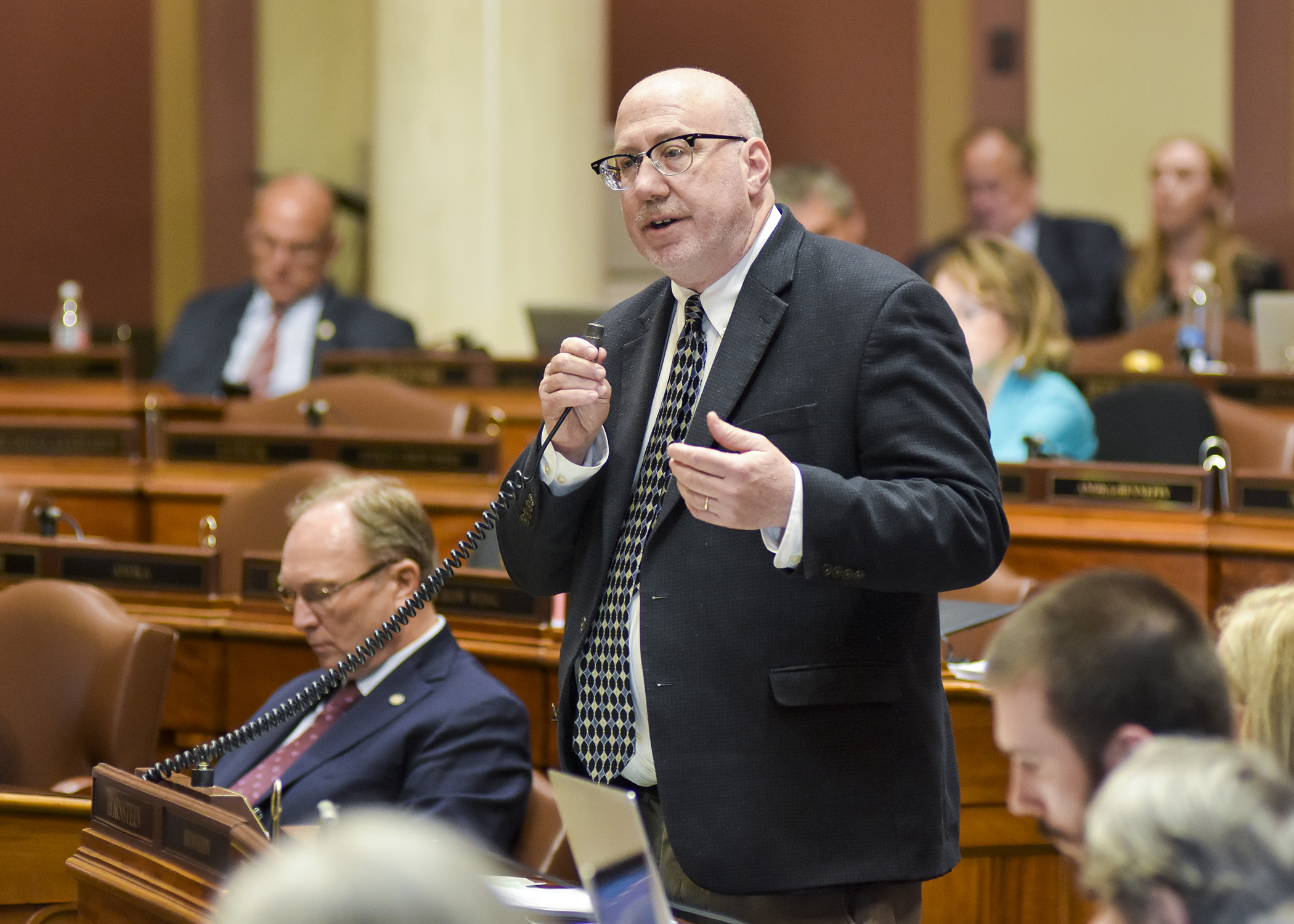‘Status quo’ transportation bill clears House

The House and Senate passed a $6.7 billion transportation finance bill Friday night that represents a scaling-back of Gov. Walz and the House DFL’s ambitions as the 2019 session began for huge new investments in Minnesota’s roads, bridges and public transit systems.
The proposal would appropriate just shy of $100 million in new transportation spending over the 2020-21 biennium. It includes $55 million to replace the troubled Minnesota Licensing and Registration System and $13 million in reimbursement to deputy registrars that were hit hard by the problematic rollout of the system in July 2017.
It also includes $50 million for the Corridors of Commerce program, and $23 million in additional proposed funding for Metro Mobility, the metro region’s increasingly stretched transit service for the elderly and people with disabilities.
The bill, sponsored by Rep. Frank Hornstein (DFL-Mpls) and Sen. Scott Newman (R-Hutchinson), doesn’t include major DFL transportation initiatives like the proposed 20-cent gas tax increase, metro area transit-dedicated sales tax increase, nor vehicle registration fee increases. Together, they would have raised an additional $1.5 billion over the biennium for road, bridge and transit projects.
[MORE: See the compromise spreadsheet]
Passed late Friday, hours into a special session to finish the two-year budget, the bill was passed a short time 54-13 by the Senate.
Hornstein expressed his disappointment in the bill on the floor, saying it came back from negotiations between the governor and legislative leaders a far different piece of legislation than he felt was needed.
“The status quo approach is actually fiscally irresponsible,” he said. “We are going to reach a funding cliff in coming years … and we will be in even more dire straits than we are now.”
DFLers have advocated for an increase in dedicated road and bridge funding through an increase in the constitutionally dedicated gas tax to tackle a $6 billion maintenance backlog. They have also pushed for an increased metro sales tax to boost spending on existing service and adding new routes.
Legislative Republicans, meanwhile, have pushed for the use of existing General Fund dollars to fund additional road and bridge projects — and haven’t been supportive of new transit funding.
“We’re doing good work here, folks,” said Rep. Paul Torkelson (R-Hanska), the Republican lead on the House Transportation Finance and Policy Division. “And I have to, from my perspective, be happy about many of the things that are not in this bill.”
Policy provisions
Also included in the agreement are a number of policy measures; among them are those that would:
- rename various stretches of state highway in memoriam to Minnesotans of note, like former Rep. Tom Rukavina, and those who died in the line of duty;
- allow Minneapolis and Burnsville to adopt ordinances to prohibit engine braking, also known as Jake braking, on specific highways;
- permit a city to establish speed limits on local streets that differ from speed limits provided in state law;
- require signs on Interstate 35 for the Minnesota State Academy for the Deaf and Minnesota State Academy for the Blind;
- amend traffic regulations related to school buses re-entering traffic from a shoulder, right-turn lane or other location used for passenger pick-up or drop-off;
- modify provisions in law related to motor vehicle dealers and vehicle registration, including authorizing dealers to determine vehicle value in registration tax calculation in some circumstances;
- modify exceptions to road weight limits to allow some overweight vehicles transporting unfinished forest products; and
- allow a driver’s license or state ID card holder to add an identifier to the card indicating they have been diagnosed with an autism spectrum disorder or a mental health condition.
Among the notable House provisions that didn’t make the cut under the agreement was the driver’s licenses for all measure. It would have issued driver’s licenses to Minnesota drivers without regard to immigration status.
Related Articles
Search Session Daily
Advanced Search OptionsPriority Dailies
Ways and Means Committee OKs proposed $512 million supplemental budget on party-line vote
By Mike Cook Meeting more needs or fiscal irresponsibility is one way to sum up the differences among the two parties on a supplemental spending package a year after a $72 billion state budg...
Meeting more needs or fiscal irresponsibility is one way to sum up the differences among the two parties on a supplemental spending package a year after a $72 billion state budg...
Minnesota’s projected budget surplus balloons to $3.7 billion, but fiscal pressure still looms
By Rob Hubbard Just as Minnesota has experienced a warmer winter than usual, so has the state’s budget outlook warmed over the past few months.
On Thursday, Minnesota Management and Budget...
Just as Minnesota has experienced a warmer winter than usual, so has the state’s budget outlook warmed over the past few months.
On Thursday, Minnesota Management and Budget...